Related Research Articles
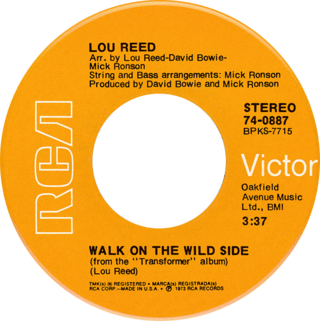
"Walk on the Wild Side" is a song by American rock musician Lou Reed from his second solo studio album, Transformer (1972). It was produced by David Bowie and Mick Ronson and released as a double A-side with "Perfect Day". Known as a counterculture anthem, the song received wide radio coverage and became Reed's biggest hit and signature song while touching on topics considered taboo at the time, such as transgender people, drugs, male prostitution, and oral sex.
"I Believe" is a popular song written by Ervin Drake, Irvin Abraham, Jack Mendelsohn and Al Stillman in 1953. The most popular version was recorded by Italian-American singer Frankie Laine, and spent eighteen weeks at No. 1 on the UK Singles Chart.
"Teach Me Tonight" is a popular song that has become a jazz standard. The music was written by Gene De Paul, the lyrics by Sammy Cahn. The song was published in 1953.
"I Remember You" is a popular song, published in 1941. The music was written by Victor Schertzinger, with lyrics by Johnny Mercer. The song was originally recorded by Jimmy Dorsey in 1941. It has since been covered most notably by Frank Ifield, Glen Campbell, Björk and George Michael.
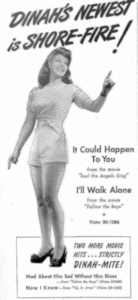
"I'll Walk Alone" is a 1944 popular song with music by Jule Styne and lyrics by Sammy Cahn. The song was written for the 1944 musical film Follow the Boys, in which it was sung by Dinah Shore, and was nominated for the Academy Award for Best Original Song but lost to “Swinging on a Star”. Shore recorded the song in March as a single, which became her first #1 hit on the Billboard charts.
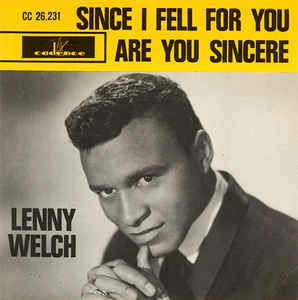
"Since I Fell for You" is a blues ballad composed by Buddy Johnson in 1945 that was first popularized by his sister, Ella Johnson, with Buddy Johnson and His Orchestra.
"Walk, Don't Run" is an instrumental composition written and originally recorded by jazz guitarist Johnny Smith in 1954, which achieved worldwide fame when The Ventures recorded a cover version in 1960.
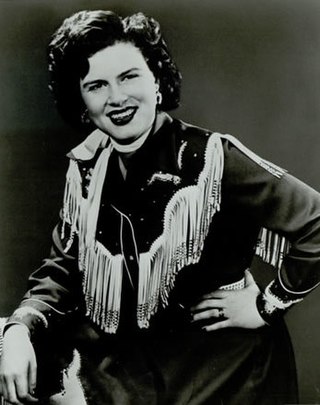
The discography of American music artist Patsy Cline consists of three studio albums, 24 singles, six extended plays, one compilation album, six other charted songs and one album appearance. Cline's discography contains material released during her lifetime. Her first recordings took place under the direction of Four Star Records. Cline's first single, "A Church, a Courtroom, Then Goodbye," was released in July 1955. Four Star issued 17 singles during Cline's four years recording with them. However, only "Walkin' After Midnight" (1957) became a major hit, reaching number 2 on the Billboard country songs chart and number 12 on the Billboard pop music chart.
"The Old Lamp-Lighter" is a popular song. The music was written by Nat Simon, the lyrics by Charles Tobias. The song was published in 1946.
"(It Will Have to Do) Until the Real Thing Comes Along" is a popular song first published in 1936.

"The Lonely Bull (El Solo Toro)" is a song by Sol Lake recorded by Herb Alpert and the Tijuana Brass among others. The song was the title track to the album The Lonely Bull, released in December 1962. The Herb Alpert single represents the first release on A&M Records. Its original title was "Twinkle Star".
"Share Your Love with Me" is a song written by Alfred Braggs and Deadric Malone. It was originally recorded by blues singer Bobby "Blue" Bland. Over the years, the song has been covered by various artists, most notably Aretha Franklin who won a Grammy Award for her 1969 rendition. Other artists who covered the song include The Band in 1973, Kenny Rogers in 1981, and most recently, Van Morrison in 2016.
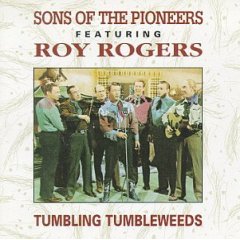
"Tumbling Tumbleweeds" is a Western music song composed by Bob Nolan, a founding member of the Sons of the Pioneers. Nolan wrote the song in the early 1930s while he was working as a caddy and living in Los Angeles. It was first recorded by the Sons of the Pioneers in 1934, and it became one of the most famous songs associated with the group. Originally titled "Tumbling Leaves", the song was reworked into the title "Tumbling Tumbleweeds" and into more widespread fame with the 1935 film of the same name starring Gene Autry. Members of the Western Writers of America chose it as one of the Top 100 Western songs of all time.
"Walking the Floor Over You" is a country music song written by Ernest Tubb, recorded on April 26, 1941 in Fort Worth, Texas, and released in the United States that year.

Bashin': The Unpredictable Jimmy Smith is a 1962 studio album by the American jazz organist Jimmy Smith, accompanied by a big band arranged and conducted by Oliver Nelson. It was Smith's first album for Verve Records. The first four tracks feature an ensemble that included future Tonight Show band members Doc Severinsen and Ed Shaughnessy.
"Reconsider Me" is a country/soul ballad written by Margaret Lewis and Mira Smith.
"Lonely Street" is a 1956 song written by Carl Belew, Kenny Sowder, and W.S. Stevenson, originally performed by Belew, and later by Dave Rich.

"Still a Woman" is a song co-written and released as a single by American country artist Margo Smith. It was one of several top ten country hits Smith would enjoy during the late 1970s. The song was the first single released from her 1979 album entitled A Woman. "Still a Woman" signified Smith's transition towards a sexually-charged persona. It has also been considered one of country music's first songs to characterize the point of view of a middle-aged woman.
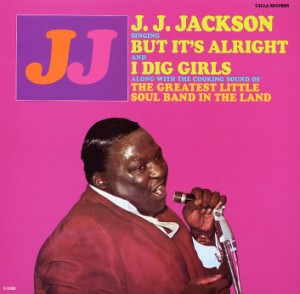
"But It's Alright" is a song co-written by J. J. Jackson and Pierre Tubbs that became a hit on the pop and soul charts in both 1966 and 1969.

"Let Me Live" is a song written by Ben Peters. It was originally recorded by American country music artist Charley Pride. The song was produced by Jack Clement and was released as a single via RCA Victor Records in 1971. The song became a top 40 hit on the Billboard country chart and in Canada. It was Pride's only gospel recording to become a major hit.
References
- ↑ "Original versions of Walk on the Wild Side written by Elmer Bernstein, Mack David | SecondHandSongs". secondhandsongs.com.
- ↑ Whitburn, Joel (2013). Joel Whitburn's Top Pop Singles, 14th Edition: 1955-2012. Record Research. p. 76.
- ↑ Bashin' on allmusic
- ↑ "Billboard Hot 100". Billboard Music Week . Vol. 74, no. 25. The Billboard Publishing Company. June 23, 1962. pp. cover. Retrieved March 3, 2013.
- ↑ Whitburn, Joel (2009). Top Pop Singles (12th ed.). Menomonee Falls, Wisconsin: Record Research Inc. p. 903. ISBN 978-0-89820-180-2 . Retrieved March 3, 2013.
- ↑ Whitburn, Joel (2004). Top R&B/Hip-Hop Singles: 1942-2004. Record Research. p. 535.
- ↑ "www.discogs.com". discogs.com. 1965. Retrieved December 26, 2022.
- ↑ "www.allmusic.com". allmusic.com. Retrieved December 26, 2022.